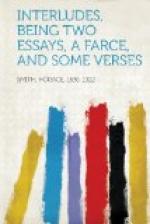“Tell Blackwood,” said Sir Walter Scott, “that I am one of the Black Hussars of Literature who neither give nor take criticism.” Tennyson resented any interference with his muse by writing the now nearly forgotten line about “Musty, crusty Christopher.” Byron flew into a rhapsodical passion and wrote English Bards and Scotch Reviewers—
“Ode, Epic, Elegy, have at you all.”
He says—
“A man must serve his time
to every trade
Save censure. Critics all
are ready made.
Take hackney’d jokes from
Miller, got by rote,
With just enough of learning to
misquote;
A mind well skilled to find or forge
a fault;
A turn for punning—call
it Attic salt;
To Jeffrey go, be silent and discreet,—
His pay is just ten sterling pounds
per sheet;
Fear not to lie, ’twill seem
a sharper hit;
Shrink not from blasphemy, ’twill
pass for wit;
Care not for feeling—pass
your proper jest,—
And stand a critic, hated yet caress’d.”
Lowell retorted upon his enemies in the famous Fable for Critics. Swift, in his Battle of the Books, revenges himself upon Criticism by describing her. “She dwelt on the top of a snowy mountain in Nova Zembla. There Momus found her extended in her den upon the spoils of numberless volumes, half devoured. At her right hand sat Ignorance, her father and husband, blind with age; at her left Pride, her mother, dressing her up in the scraps of paper herself had torn. About her played her children Noise and Impudence, Dulness and Vanity, Pedantry and Ill-manners. The goddess herself had claws like a cat. Her head, ears, and voice resembled those of an ass.” Bulwer (Lord Lytton) flew out against his critics, and was well laughed at by Thackeray for his pains. Poets are known as the genus irritabile, and I do not know that prose writers, artists, or musicians are less susceptible. Most of us will remember Sheridan’s Critic—
Sneer: “I think it wants incident.”
Sir Fretful: “Good Heavens, you surprise me! Wants incident! I am only apprehensive that the incidents are too crowded.”
Dangle: “If I might venture to suggest anything, it is that the interest rather falls off in the fifth act.”
Sir Fretful: “Rises, I believe you mean, sir.”
Mrs. Dangle: “I did not see a fault in any part of the play from the beginning to the end.”
Sir Fretful: “Upon my soul the women are the best judges after all.”
In short, no one objects to a favourable criticism, and almost every one objects to an unfavourable one. All men ought, no doubt, to be thankful for a just criticism; but I am afraid they are not. As a result, to criticize is to be unpopular. Nevertheless, it is better to be unpopular than to be untruthful.
“The truth once out,—and
wherefore should we lie?—
The Queen of Midas slept, and so
can I.”




